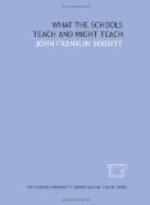It would seem, however, from a careful study of the actual work and an examination of the printed documents, that the chief purpose of teaching reading in this city is, to use the terminology of its latest manual, “easy expressive oral reading in rich, well-modulated tone.” It is true that other aims are mentioned, such as enlargement of vocabulary, word-study, understanding of expressions and allusions, acquaintance with the leading authors, appreciation of “beautiful expressions,” etc. Properly emphasized, each of these purposes is valid; but there are other equally valid ends to be achieved through proper choice of the reading-content that are not mentioned. There is here no criticism of the purposes long accepted, but of the apparent failure to recognize other equally important ones. The character of the reading-content is referred to only in the recommendation that in certain grades it should relate to the seasons and to special occasions. Even in reference to the supplementary reading, where content should be the first concern, the only statement of purpose is that “children should read for the joy of it.” Unfortunately, this mistaken emphasis is not at all uncommon among the schools of the nation. How one reads has received an undue amount of attention; what one reads in the school courses must and will receive an increasingly large share of time and thought, in the new evaluation. The use of interesting and valuable books for other educational purposes at the same time that they are used for drill in the mechanics of reading is coming more and more to be recognized as an improved mode of procedure. The mechanical side of reading is not thereby neglected. It is given its proper function and relation, and can therefore be better taught.
So far as one can see, Cleveland is attempting in the reading work little more than the traditional thing. The thirty-four per cent excess time may be justified by the city on the theory that the schools are commissioned to get the work done one-third better than in the average city. The reading tests made by the Survey fail to reveal any such superiority. The city appears to be getting no better than average results.
Certainly people should read well and effectively in all ways in which they will be called upon to read in their adult affairs. For the most part this means reading for ideas, suggestions, and information in connection with the things involved in their several callings; in connection with their civic problems; for recreation; and for such general social enlightenment as comes from newspapers, magazines, and books. Most reading will be for the content. It is desirable that the reading be easy and rapid, and that one gather in all the ideas as one reads. Because of the fact that oral reading is slower, more laborious for both reader and listener, and because of the present easy accessibility of printed matter, oral reading is becoming of steadily diminishing importance to adults. No longer should the central educational purpose be the development of expressive oral reading. It should be rapid and effective silent reading for the sake of the thought read.




